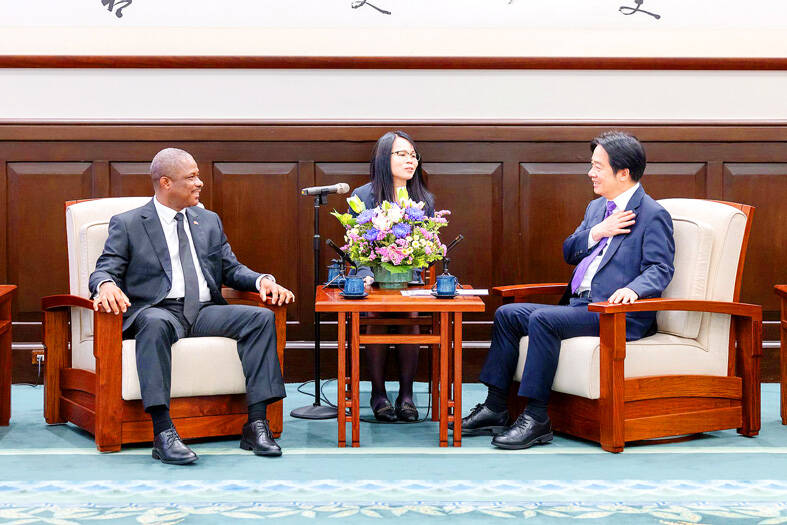President William Lai (賴清德) yesterday pledged continued support for Haiti, particularly in food aid and healthcare, as the Caribbean nation faces ongoing social and economic challenges.
Speaking at a meeting with Haitian Minister of Foreign Affairs Jean-Victor Harvel Jean-Baptiste, Lai said Taiwan would step up bilateral cooperation to help improve Haiti’s social infrastructure.
Taiwan would continue supporting Haiti through initiatives aimed at improving healthcare, food security and overall development, he said.

Photo courtesy of the Presidential Office
Taiwan and Haiti are set to mark the 70th anniversary of diplomatic relations next year, the president said, adding that the two nations would continue to support each other and deepen bilateral ties.
Lai also thanked Jean-Baptiste for writing to the WHO Secretariat in May to push for Taiwan’s participation in the annual World Health Assembly (WHA) as an observer this year, and Haitian Minister of Public Health and Population Bertrand Sinal for speaking out at the WHA about Taiwan’s global healthcare contribution and supporting Taiwan’s participation in international organizations.
Jean-Baptiste reaffirmed the longstanding ties between Taiwan and Haiti, saying they had contributed to Haiti’s development in areas such as agriculture, healthcare and education.
Taiwan’s voice is important to people in Haiti, as it has established itself as a responsible, peaceful and innovative actor committed to global cooperation, the Haitian minister said.
As the world is confronting major challenges and Haiti is facing its most difficult period in its history, the need for bilateral cooperation and solidarity is more important then ever, he said, adding that the two nations need to think about how to move forward and deepen their relationship to benefit their people.
Jean-Baptiste is leading a five-member delegation to Taiwan until Friday.

CROSS-STRAIT COLLABORATION: The new KMT chairwoman expressed interest in meeting the Chinese president from the start, but she’ll have to pay to get in Beijing allegedly agreed to let Chinese Nationalist Party (KMT) Chairwoman Cheng Li-wun (鄭麗文) meet with Chinese President Xi Jinping (習近平) around the Lunar New Year holiday next year on three conditions, including that the KMT block Taiwan’s arms purchases, a source said yesterday. Cheng has expressed interest in meeting Xi since she won the KMT’s chairmanship election in October. A source, speaking on condition of anonymity, said a consensus on a meeting was allegedly reached after two KMT vice chairmen visited China’s Taiwan Affairs Office Director Song Tao (宋濤) in China last month. Beijing allegedly gave the KMT three conditions it had to

STAYING ALERT: China this week deployed its largest maritime show of force to date in the region, prompting concern in Taipei and Tokyo, which Beijing has brushed off Deterring conflict over Taiwan is a priority, the White House said in its National Security Strategy published yesterday, which also called on Japan and South Korea to increase their defense spending to help protect the first island chain. Taiwan is strategically positioned between Northeast and Southeast Asia, and provides direct access to the second island chain, with one-third of global shipping passing through the South China Sea, the report said. Given the implications for the US economy, along with Taiwan’s dominance in semiconductors, “deterring a conflict over Taiwan, ideally by preserving military overmatch, is a priority,” it said. However, the strategy also reiterated

‘BALANCE OF POWER’: Hegseth said that the US did not want to ‘strangle’ China, but to ensure that none of Washington’s allies would be vulnerable to military aggression Washington has no intention of changing the “status quo” in the Taiwan Strait, US Secretary of Defense Pete Hegseth said on Saturday, adding that one of the US military’s main priorities is to deter China “through strength, not through confrontation.” Speaking at the annual Reagan National Defense Forum in Simi Valley, California, Hegseth outlined the US Department of Defense’s priorities under US President Donald Trump. “First, defending the US homeland and our hemisphere. Second, deterring China through strength, not confrontation. Third, increased burden sharing for us, allies and partners. And fourth, supercharging the US defense industrial base,” he said. US-China relations under

The Chien Feng IV (勁蜂, Mighty Hornet) loitering munition is on track to enter flight tests next month in connection with potential adoption by Taiwanese and US armed forces, a government source said yesterday. The kamikaze drone, which boasts a range of 1,000km, debuted at the Taipei Aerospace and Defense Technology Exhibition in September, the official said on condition of anonymity. The Chungshan Institute of Science and Technology and US-based Kratos Defense jointly developed the platform by leveraging the engine and airframe of the latter’s MQM-178 Firejet target drone, they said. The uncrewed aerial vehicle is designed to utilize an artificial intelligence computer